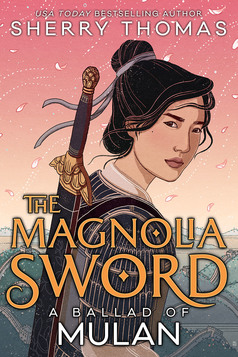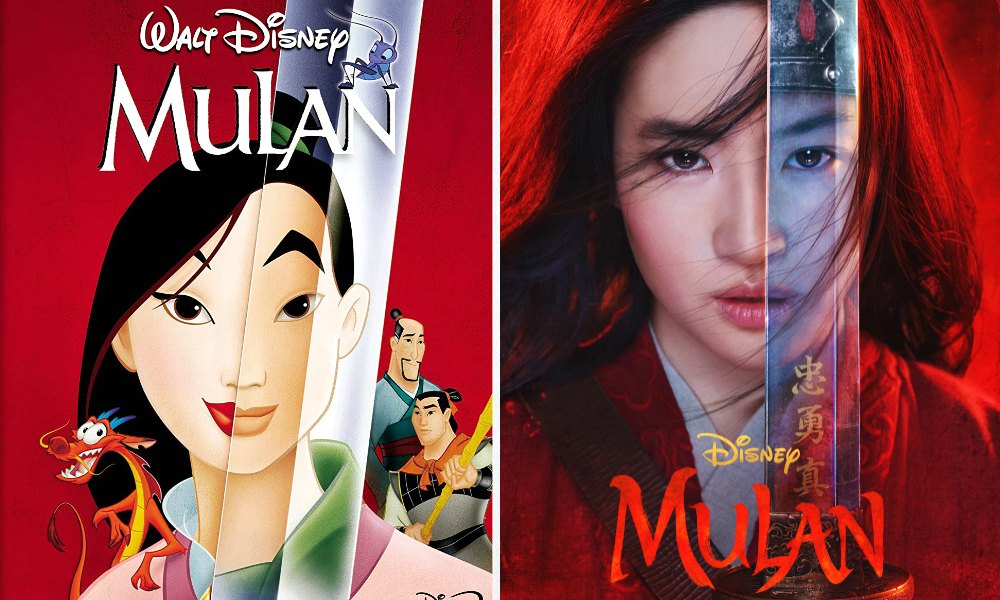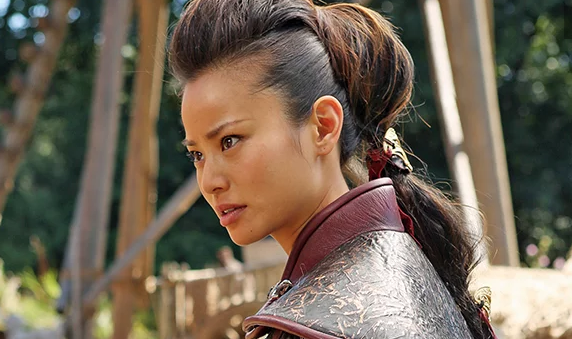 Released last week, The Magnolia Sword is the first young adult novel to reimagine the ballad of Mulan. We interviewed bestselling author Sherry Thomas on what piqued her interest in writing about Mulan and the different iterations of the beloved woman warrior in pop culture.
Released last week, The Magnolia Sword is the first young adult novel to reimagine the ballad of Mulan. We interviewed bestselling author Sherry Thomas on what piqued her interest in writing about Mulan and the different iterations of the beloved woman warrior in pop culture.
What was your approach when researching for The Magnolia Sword? What resources or organizations did you turn to while writing the story?
Sherry Thomas: I consulted everything from reddit threads to academic publications, along with various sources in the Chinese language, including my personal copy of Chinese Idiomatic Expressions Dictionary.
Northern Wei, the time period typically agreed on for the setting of the Ballad of Mulan, is not a major dynasty. So I would get whole books on food, clothing, etc. in ancient China and be able to use only a few pages. (Thank goodness for interlibrary loans!)
Another important source of research is actually Google Earth, which allows me to investigate the actual shape and elevation of the terrain that I would put my character into, and see photos people have taken of the general area.
Are you a big fan of Mulan? Why did you choose to write about her and what new vision about this iconic character did you want to bring to readers?
ST: I had never given any thoughts to Mulan before Cheryl Klein, Lee & Low’s editorial director, approached me about writing an adaptation of the ballad. Mulan is a cultural icon, but so are Beowulf and King Arthur and I’m sure plenty of people go through their lives never thinking of either.
One reason I rarely, if ever, thought of Mulan was that I was unmoved by the Disney animated film, which we’ll talk a little more about below. Another reason is that the original ballad is really spare on Mulan’s life in the military. More words are devoted to her preparations for departure than her ten years as a soldier. And it’s all action, never delving below the surface. So the woman at the center of the tale remains a cipher. No emotions, just a legend.

When it was made clear to me that one, the adaption the Cheryl wanted was of the original ballad and not the Disney movie, and two, she sought a full-length YA novel, and not a middle-grade work or chapter book for intermediate readers, that was when I became intrigued.
Because the vista suddenly became wide open. It didn’t matter anymore that I didn’t know much about Mulan. Nobody knew enough about Mulan to write an eighty-thousand-word novel without building the character, the world, and the adventure from the ground up.
In the end I decided to infuse the legend of Mulan with elements of wuxia, a unique Chinese literary genre that explores the themes of honor, sacrifice, vengeance, and forgiveness through the deeds of almost mythically adept martial artists.
My Mulan is many things. She is a refugee who saves her adopted country. She is a female in a male-dominated society, carving out a place for herself. But above all she is someone who finds her courage when she needs it the most, and who learns, as she comes into her own power, that perhaps the greatest power of all is that of forgiveness.
There was a lot of uproar from American audiences that the new Mulan film wouldn’t include singing or Mulan’s guardian, Mushu. However, people from China were actually pleased with these changes because they felt that the Disney version of Mulan was stereotypical and problematic in terms of portraying Chinese culture. How were you able to keep that balance of appealing to Western audiences, while still showing Chinese culture in an accurate light?
ST: I am one of those Chinese people who didn’t recognize the ancient China portrayed in Disney’s Mulan. Or rather, I needed to squint and look at it sideways to undo the warping effect of the exaggerated and sometimes inaccurate depiction. (Mulan embracing the emperor at the end of the movie is usually the example that comes to mind of a staggering impossibility. China had such a long and often chaotic history, and there were so many uprisings, rebellions and assassinations in that history, no one could have approached an emperor like that without losing both hands and her head.)

In recent years, even before I came to write The Magnolia Sword, I’d been giving a lot of thought to how to accurately depict culture. I don’t think there is a single answer to the question, but my view is that in fiction, culture should be experienced through character.
No two persons live in the same reality. My son and I share the same house, but he is born and brought up in the US, having never spent substantial time abroad, whereas I had my formative years in China. Our foundational cultural touchstones are different.
On top of that, even though we are now bathed in the same American culture, we are of different genders, different generations, and very different interests. So what we take from the culture and how current events may or may not impact us are also very different.
Depending on personal circumstances and traits, an absolute cultural rule for one person might be only a suggestion to another. And the former, faced with this rule, might either submit or rebel, willing to break the culture rather than betray herself.
So my approach has always been to write about culture from the perspective of fully-human characters as they experience and sometimes clash with their surroundings.
Many versions of Mulan seem to have her ultimately marrying. Do you think audiences would’ve been as receptive to the story if Mulan hadn’t married?
ST: The original ballad doesn’t have Mulan marrying. But then again, the original ballad doesn’t have a romance.

Ancient China was rather restrictive in terms of how much time men and women could spend with one another outside of marriage. Confucius advocated for zero fraternization beyond age 7, so that should tell you something about the general view.
Not to say that young men and young women didn’t manage to meet a sweetheart here and there, but that because of the primary importance placed on continuing the bloodline, people often married young, with the matches arranged by their families, and not themselves.
So if one does put in a romance for Mulan, it seems reasonable to suppose that said romance would lead to marriage, provided that parents on both sides approved.
I personally don’t think the receptivity to any Mulan retelling rests on her marital status at the end of the story—I was deliberately vague on that in The Magnolia Sword—but to some readers it would have been seen as the icing on the cake.
Then again, mostly people are here for the cake, icing or not.
There have been several versions of Mulan, from the aforementioned Disney movie, to Maxine Hong Kingston’s 1975 The Woman Warrior, to actress Jamie Chung’s portrayal in Once Upon a Time. Why do you think Mulan continues to resonate with so many generations past, present, and future?
ST: First, because it really is such a magnificent feat of love and courage, to go to war in your father’s stead, and we want to cheer on such good people. Two, because we continue to live in a male-dominated society and readers continue to crave stories in which women prove themselves equal to any arena of power and responsibility from which they’d been hitherto excluded. Three, there is such inherent drama and excitement in the construction of a story with a war looming, a family torn asunder, a young girl in disguise, having to figure out not only what to do, but who she is, in the midst of the most stressful situation imaginable.
Learn more about The Magnolia Sword here and purchase a copy.
 About the Author: Sherry Thomas is the author of nineteen novels across multiple genres, including the acclaimed Lady Sherlock mystery series, a YA fantasy trilogy that began with The Burning Sky, and more than a dozen romance novels, which have twice won her the Romance Writers of America’s prestigious RITA® Award. Born in China, she learned English as a second language, and now lives and writes in Austin, Texas. Visit her website at sherrythomas.com and follow her on Twitter at @sherrythomas and on Instagram as @writersherrythomas.
About the Author: Sherry Thomas is the author of nineteen novels across multiple genres, including the acclaimed Lady Sherlock mystery series, a YA fantasy trilogy that began with The Burning Sky, and more than a dozen romance novels, which have twice won her the Romance Writers of America’s prestigious RITA® Award. Born in China, she learned English as a second language, and now lives and writes in Austin, Texas. Visit her website at sherrythomas.com and follow her on Twitter at @sherrythomas and on Instagram as @writersherrythomas.

